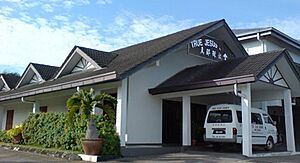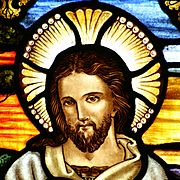True Jesus Church facts for kids

The True Jesus Church Olive Garden Training Centre, Port Dickson, Malaysia
|
|
| Abbreviation | TJC |
|---|---|
| Established | 1917 |
| Founder | Paul Wei |
| Founded at | Beijing, China |
| Type | Christian Church |
| Headquarters | Lakewood, California |
|
Area served
|
60+ countries |
|
Membership (2013)
|
1,500,000–3,000,000 |
|
Official language
|
English, Chinese, Japanese, Korean, Indonesian, Malay, German, Spanish, French, Portuguese, Russian, Vietnamese |
|
Key people
|
Paul Wei, Ling-Sheng Zhang, and Barnabas Zhang (early workers) |
|
Main organ
|
International Assembly |
| Affiliations | Nondenominational Christianity Oneness Pentecostal |
| True Jesus Church | |||||||
|---|---|---|---|---|---|---|---|
| Traditional Chinese | 真耶穌教會 | ||||||
| Simplified Chinese | 真耶稣教会 | ||||||
|
|||||||
The True Jesus Church (often called TJC) is a Christian church that started in Beijing, China, in the early 1900s. It is a "non-denominational" church, meaning it's not part of a larger group like Catholics or Protestants. It follows a type of Christian belief called Oneness Pentecostal theology. Today, the True Jesus Church is one of the biggest Christian groups in China and Taiwan. It is also one of the largest independent churches around the world.
Contents
History of the True Jesus Church
The True Jesus Church began in 1917 in China. It started around the same time as other new Christian groups in the country. The church was founded by a silk merchant named Paul Wei (also known as Wei Enbo).
Early Influences and Leaders
Early members of the True Jesus Church were influenced by other Christian groups. They adopted practices like faith healing (believing God can heal sickness), baptism of the Holy Spirit (a special spiritual experience), footwashing (a symbolic act), and keeping the Sabbath (a holy day of rest).
Paul Wei was an important early leader. He had been part of another missionary group before starting the TJC. He passed away in 1919, but the church continued to grow. Other key early workers included Zhang Lingsheng, who helped the church decide to keep the Sabbath on Saturday. Another leader, Barnabas Zhang, later started his own group.
Growth and Changes in China
After Paul Wei, his son, Wei Wenxiang (also called Isaac Wei), became a leader. He helped the True Jesus Church grow internationally. By 1949, the church had about 120,000 members in 700 churches.
However, due to big changes in China, the True Jesus Church outside China lost touch with its churches there. Isaac Wei was arrested in 1951 and disappeared. Later, Li Zhengcheng became the main leader in China. He led the church to join a government-approved Christian group called the Three-Self Patriotic Movement. Despite this, the church faced difficult times, and Li Zhengcheng spent many years in jail.
Because of these events in China, the True Jesus Church outside China decided to become independent. Their main office moved to Taiwan and then to the U.S. The Chinese branch of the church later reformed and still has many followers in China. Today, the True Jesus Church has members in over 60 countries. Some experts believe there are up to 3 million members worldwide.
How the True Jesus Church is Organized
The True Jesus Church has different ways of organizing itself depending on the country.
True Jesus Church in Mainland China
In mainland China, most True Jesus Church groups are part of the Three-Self Patriotic Movement. They often meet on Saturdays in the same church buildings used by the TSPM. However, some of their practices, like healing and speaking in tongues, are not always encouraged by the TSPM. Because of this, some True Jesus Church groups in China meet independently in what are called Chinese house churches.
True Jesus Church in Taiwan and the United States
Outside of China, the True Jesus Church congregations look to a central group in California, USA. In 1967, church leaders from different countries met in Taiwan. They set up an international headquarters there and opened a school for church leaders. This headquarters later moved to California in 1985.
True Jesus Church in the United Kingdom
In the United Kingdom, True Jesus Church groups started because people moved there in the 1960s and 1970s. Many came from Malaysia and Hong Kong. This led to churches being set up in places like Leicester, Newcastle, Sunderland, Elgin, Edinburgh, and Cardiff.
Core Beliefs of the True Jesus Church
The True Jesus Church has ten main beliefs that guide its members.
|
Church Practices
The True Jesus Church performs baptism by fully immersing both adults and babies in water. They also have holy communion. Speaking in tongues is a common practice, especially during prayer.
The church believes that special ceremonies, called sacraments, must meet three rules from the Bible. First, Jesus Christ must have performed them as an example. Second, these ceremonies must be directly connected to a person's salvation, eternal life, entering heaven, and being connected with Jesus. Third, Jesus must have told his disciples to perform these ceremonies. The True Jesus Church believes that speaking in tongues is proof of receiving the Holy Spirit. The way baptism is done is also important for salvation. They believe the correct way is to be baptized with the head facing down (like Jesus' death) and only in natural, "living" water.
 | Frances Mary Albrier |
 | Whitney Young |
 | Muhammad Ali |


